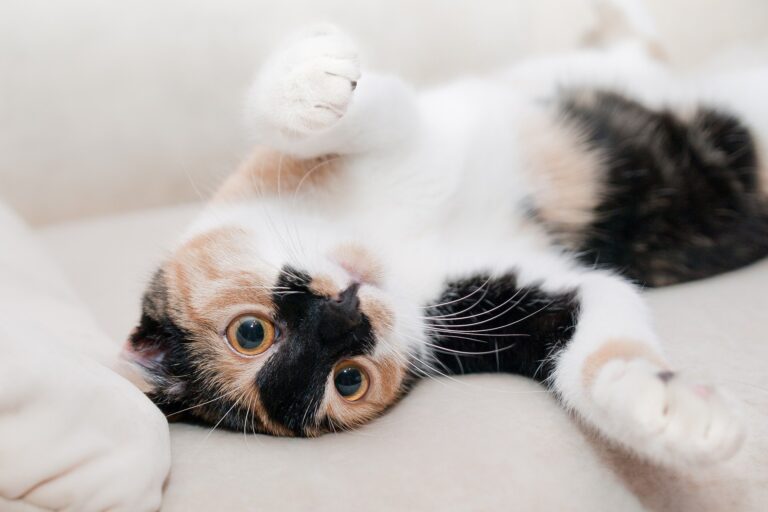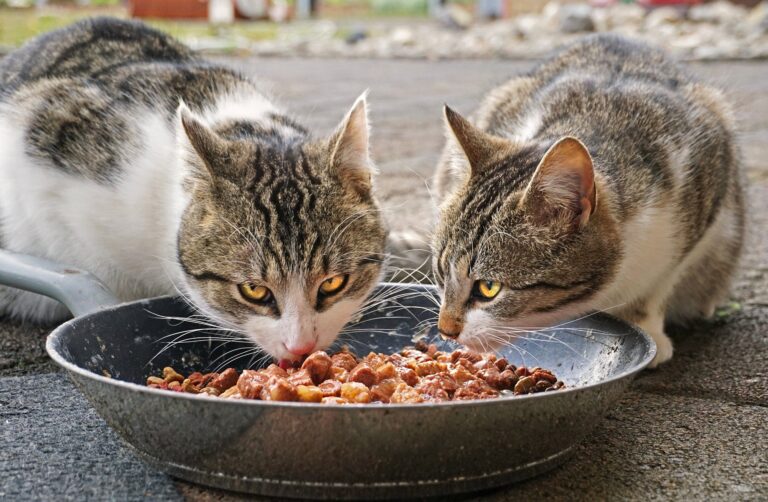A cat with diarrhea can cause great pity. In many cases, the phenomenon is unproblematic or at least easily treatable. We tell you what diarrhea is all about, what types and triggers there are and when you need to react. By the way: With our tips you can prevent some causes of diarrhea in cats.
Attention: Diarrhea Can Be Life-Threatening!
As with vomiting, a cat with diarrhea loses fluid. The intestinal tissue extracts water from the body in order to remove problematic substances more quickly. The fluid is then naturally lacking in other places.
By drinking, a cat with diarrhea can stabilize its water balance again. Therefore, you should make sure that she always has access to fresh water and also drinks actively. If she does not want to, motivate her to do so. Since many cats like to drink moving water, try a drinking fountain.
With the skin fold test you can find out whether the animal is already dehydrated, i.e. suffers from a threatening lack of water. If there is not enough fluid in the organism, the skin is no longer elastic. Squeeze a fold of skin in the cat’s neck and see if the fold remains. If it does, your cat is dehydrated. If she will not drink then, contact the veterinarian.
There Are Two Types Of Diarrhea In Cats.
A cat with diarrhea can experience it in two different ways: acute or chronic.
Acute diarrhea is when the problem persists for a period of time between a few hours and a few days at most. So, a cat that has diarrhea one day and then not for a long time is acutely affected. This type of diarrhea usually subsides without human intervention. In some cases, however, medical treatment at the veterinarian is necessary, more about this later.
Chronic diarrhea affects the cat much longer. It occurs regularly and lasts longer than three weeks. This means that it is only chronic diarrhea when the cat suffers from it repeatedly for at least 21 days in a row.
If your pet is chronically affected, there is a serious health problem. It is imperative to consult a veterinarian. Diarrhea rarely goes away on its own. Therefore, you should not hesitate for long, but prepare the carrier for your cat. However, many triggers can be reliably eliminated by treatment.
Diarrhea In Cats Originates Either In The Small Intestine Or In The Large Intestine
In addition to acute and chronic diarrhea, a distinction can also be made between where diarrhea originates. It originates either in the small intestine or in the large intestine. The two digestive sections have different tasks during food decomposition.
The small intestine plays the main role, as it extracts nutrients from the food. The food pulp tends to be thin at this stage so that this works out without any problems. After the small intestine has done its work, the large intestine is only responsible for removing the water from the digested mass. Thus, an optimal digestive process leaves a rather solid feces, which can be excreted cleanly.
How You Can Estimate The Place Of Formation
Based on this information, you can infer where the trigger is likely to be by looking at the cat’s excreted diarrhea. Diarrhea from the large intestine tends to be mushy, while that from the small intestine tends to leave the animal liquid. There are also other peculiarities that we will show you in the two lists.
Indications For Diarrhea From The Small Intestine
- often together with vomiting
- the feces have a rather large volume
- the animal does not have to go to the litter box or only a little more often than usual
- in case of chronic diarrhea weight loss occurs early
- because of the loss of nutrients the cat is quickly weakened
- black colored diarrhea is an indication of bleeding in the small intestine
Indications For Diarrhea From The Large Intestine
- Vomiting and mucus in the feces are possible
- Feces are only slightly more voluminous than normal
- the animal goes to the litter box more often than usual
- painful, strained bowel movements (almost like constipation)
- in case of chronic diarrhea only slight weight loss, no weakness
- red colored diarrhea is an indication of bleeding in the large intestine
Cat Diarrhea From Small Or Large Intestine? The Most Common Triggers
But what good does knowing how diarrhea manifests itself in the small or large intestine do you? According to experts, this allows you to draw conclusions about the cause of the problem. Can you assign the symptom in your cat to one of the two intestinal sections? Then it will be easier for you to find the trigger and to take targeted action against it.
Causes For Small Intestine Diarrhea
Probably the most harmless reason for your cat suffering from diarrhea from the small intestine is spoiled food. If this is the case, the diarrhea should pass quickly.
If, on the other hand, the cat has poisoned itself, diarrhea will also develop in this section of the intestine. It is very severe and is usually accompanied by vomiting and other symptoms of poisoning. The cat is also very unwell. Poisoning is always an emergency!
Almost all house cats – whether apartment cats or free roamers – get infected with parasites. Most of the species considered for this can cause diarrhea. In the case of roundworms and tapeworms, however, a heavy infestation must be present before obvious symptoms such as diarrhea occur. By the way, a cat often gets tapeworms from fleas. The worms do not cause damage to the animal’s body until weeks or months later. Tell your vet if the cat has had fleas recently.
A very young cat with diarrhea and parasites is probably infested with Tritrichomonas foetus. These pests also cause blood and mucus in the feces. A fourth type of parasite associated with diarrhea is Giardia. When infected, however, diarrhea rarely occurs. Parasites must be treated promptly. The best person to contact is the veterinarian.
Kittens and shelter cats can get diarrhea from a bacterial infection, for example, the Campylobacter and Salmonella species. Otherwise, an infection with viruses is also conceivable. In question is the parvovirus (feline epidemic), which unfortunately leads to the death of the affected animal. In addition to the rather harmless coronaviruses for cats, an infection with feline leukemia viruses (FeLV) and feline immunodeficiency viruses (FIV) could also be present. FIV and FeLV are unfortunately not curable.
Attention: Feline leukemia and FeLV are diseases you can prevent by vaccinating your cat!
In addition to the causes mentioned so far, diarrhea also occurs when the cat suffers from an inflammation of the pancreas or an intestinal obstruction.
Causes Of Large Intestine Diarrhea
Incorrect food is also a possible cause of colon diarrhea. Often, older cats tend to have it if their food does not have enough fiber. A change of food may provide relief. Unfortunately, with this type of diarrhea, other causes tend to be more serious. You should exercise caution when dealing with chronic cat diarrhea.
Possible triggers include these:
- Liver disease
- Kidney disease
- Vitamin B12 deficiency
- Inflammation of the pancreas
- Hypofunction of the pancreas
- Hyperthyroidism (overactive thyroid gland)
- Intestinal cancer
Cat With Diarrhea: When To Go To The Vet?
Diarrhea in the cat is sometimes an indication of a threatening disease. Therefore, it is important not to put off going to the vet. Even if a bad diagnosis is foreseeable, your cat needs every support, especially that of your veterinarian. He may be able to stop or even cure the disease. Most importantly, he can stop the annoying symptoms like the diarrhea or any pain.
But when should you go to the vet’s office on the same day? If the diarrhea is accompanied by severe vomiting and poor general condition, your cat needs medical help quickly. Otherwise, we advise a visit to the vet if the diarrhea lasts for several days. At the latest after three weeks the animal must be examined, because from this point on it is chronic diarrhea.
And When Is A Veterinarian Not Necessary?
In the case of a one-time or rare diarrhea that does not cause any additional symptoms, a visit to the veterinarian is not worthwhile. Most of the time, the cause cannot be found out.
Tip For The Visit To The Practice
In case of diarrhea, it is useful to bring a fecal sample with you. With this sample, the laboratory in the practice can find out, for example, whether your cat with diarrhea suffers from parasites. In some cases it is worthwhile to bring a composite sample. In this case, you collect samples from all the feces that your cat has given over three days. This is important because the eggs of the parasites are not excreted with every bowel movement.
Cat With Diarrhea: Home Remedies Sometimes Help
If she is otherwise in good condition, you can also offer home remedies to your cat with diarrhea. The best is a high quality cat food. It should be of good quality and easily digestible. In addition, a high percentage of fiber is beneficial. If your pussycat suffers from allergies, a hypoallergenic cat food is the ideal choice.
Does the cat have diarrhea? A home remedy of first choice, in addition to a good food, is a probiotic. They serve to support the intestines and promote microorganisms. The cat is usually very fond of this diarrhea home remedy because it tastes good.
However, you should not expect too much from the home remedies. They can only provide relief in mild cases. Nevertheless, it does not hurt to feed the cat with good food and probiotics.
FAQ – Frequently Asked Questions About Diarrhea In Cats
Some questions about diarrhea in cats are asked again and again. In the next paragraphs we would like to answer some of them.
How To Stop Diarrhea In Cats?
Acute diarrhea in cats usually stops by itself. Chronic diarrhea is a different story, because it does not subside, but occurs regularly. Home remedies such as better food and probiotics can be helpful in some cases. This also includes gentle diets.
What Do I Feed My Cat When It Has Diarrhea?
It is not wise to fast a cat with diarrhea for more than 24 hours to resolve the problem. These pets are not suited to prolonged periods of starvation and will suffer organ damage early on. So feed her a gentle diet. You can even make it yourself, for example with boiled chicken, unsalted rice or pureed carrots.
Can Cats Get Diarrhea From Wet Food?
Yes, if they can’t tolerate the food, it has too little fiber or is spoiled. It doesn’t matter if the cat eats dry or wet food. With barfing, diarrhea is more common, especially if you feed raw meat. It can be contaminated with germs. Therefore, barfing is not the best form of nutrition for pets.
What To Do If The Cat Has Soft Feces?
Soft feces can be an indication of a problem in the colon. You should keep an eye on the cat. Our information above will help.
When Does Diarrhea In A Cat Become Dangerous?
How dangerous diarrhea is in a cat depends mostly on the trigger. From harmless to life-threatening, anything is possible. However, it is said that recurrent diarrhea becomes dangerous after a few days.
Can A Cat Die From Diarrhea?
Diarrhea can put the cat’s life in danger: It is possible for her to become dehydrated due to dehydration. Therefore, it is important to offer her water.
How Long Can A Cat Live With Diarrhea?
In very severe diarrhea with vomiting, a cat can die within 24 hours if it becomes dehydrated. In chronic or acute diarrhea, it is different. In some cases even sick cats have some time left. This is because many diseases can be cured or treated. It is best to ask your veterinarian, because he knows the condition of your cat best.









